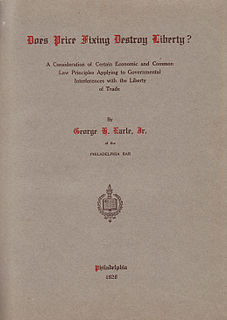Related Research Articles
The Robinson–Patman Act of 1936 is a United States federal law that prohibits anticompetitive practices by producers, specifically price discrimination. Co-sponsored by Senator Joseph T. Robinson and Representative Wright Patman, it was designed to protect small retail shops against competition from chain stores by fixing a minimum price for retail products. Specifically, the law prevents suppliers, wholesalers, or manufacturers from supplying goods to “preferred customers“ at a reduced price. It also prevents coercing suppliers into restrictions as to who they can and can’t sell goods.

Price fixing is an agreement between participants on the same side in a market to buy or sell a product, service, or commodity only at a fixed price, or maintain the market conditions such that the price is maintained at a given level by controlling supply and demand.

Bertelsmann Music Group (BMG) was a division of German media company Bertelsmann before its completion of sale of the majority of its assets to Sony Corporation of America on 1 October 2008. Although it was established in 1987, the music company was formed as RCA/Ariola International in 1985 as a joint venture to combine the music label activities of RCA Corporation's RCA Records division and Bertelsmann's Ariola Records and its associated labels which include Arista Records. It consisted of the BMG Music Publishing company, the world's third largest music publisher and the world's largest independent music publisher, and the 50% share of the joint venture with Sony Music, which established the German American Sony BMG from 2004 to 2008.
The list price, also known as the manufacturer's suggested retail price (MSRP), or the recommended retail price (RRP), or the suggested retail price (SRP) of a product is the price at which the manufacturer recommends that the retailer sell the product. The intention was to help standardize prices among locations. While some shops/stores always sell at, or below, the suggested retail price, others do so only when items are on sale or closeout/clearance.
Tower Records is an international retail music franchise and online music store that was formerly based in Sacramento, California, United States. From 1960 until 2006, Tower operated retail stores in the United States, which closed when Tower Records filed for bankruptcy and liquidation. Tower.com was purchased by a separate entity and was not affected by the retail store closings.

CDnow, Inc. was a dot-com company that operated an online shopping website selling compact discs and music-related products. In April 1998, during the dot-com bubble, the company was valued at over $1 billion. In July 2000, it was acquired by Bertelsmann Music Group for $117 million; shortly thereafter Amazon was contracted to operate the website. At its peak, it employed over 750 people and had offices in Fort Washington, Pennsylvania, New York City, London, and Los Angeles.

The Columbia House brand was introduced in the early 1970s by the Columbia Records division of CBS, Inc. as an umbrella for its mail-order music clubs, the primary incarnation of which was the Columbia Record Club, established in 1955. It had a significant market presence in the 1970s, 1980s and early 1990s.
Kaspien Holdings is an American company that provides software and services for ecommerce. Kaspien Holdings operates on Amazon in the United States, Canada, United Kingdom, Spain, France, Italy, Germany, the Netherlands, Sweden, and India, as well as Walmart Marketplace, eBay, Google Shopping, and Target. It's CEO is Kunal Chopra, who's held the position since September 2019.

WOW HD is an online store owned and operated by Élan Media Partners. They have offices in Sydney, Melbourne and Hong Kong and operate in 15 countries, hosting its servers in Australia and Jersey in the Channel Islands. They have 70 staff worldwide.
Sam Goody was a music and entertainment retailer in the United States and United Kingdom, operated by The Musicland Group inc. It was purchased by Best Buy in 2000, sold to Sun Capital in 2003, and filed for bankruptcy in 2006, closing most of its stores. The remaining stores were purchased by Trans World Entertainment which also runs FYE, Saturday Matinee, and Suncoast Motion Picture Company. It specialized in music, video, and video game sales. In 2008 Trans World converted most Sam Goody stores into FYE, though two still operate under the Sam Goody name.

Herbert H. Haft was a Washington, D.C. based businessman who was famous first for the development of discount stores in the drug store, bookstore, and auto part businesses, and later as a corporate raider.
The Musicland Group, Inc. was an entertainment company that ran Musicland, Sam Goody, Discount Records, Suncoast Motion Picture Company, On Cue, and the Media Play Superstore Chains. The Musicland Group was purchased by Best Buy in 2001 at the height of Musicland's success, which ultimately led to its demise. Jack Eugster was the CEO of The Musicland Group, from 1980, until February 2001. Its headquarters were in Minnetonka, Minnesota.
Loehmann's was an American retail company which started as a single store in Brooklyn, New York and grew to a chain of off-price department stores in the United States. The chain was best known for its "Back Room", where women interested in fashion could find designer clothes at prices lower than in department stores. While the largest portion of its client base was historically women, the chain also offered shoes, accessories, and men's clothing.

Camera World was a retailer of photographic equipment and photofinishing services based in Portland, Oregon, United States, and founded in 1977. It was an independent company until 2002, and then from 2002 to 2016 it was a brand of Ritz Camera & Image or C&A Marketing. In the mid-1990s, it was one of the largest mail-order retailers of photographic and audio equipment in the nation. The company's revenues totalled $80 million in 1998, of which $16 million were from online sales. Revenues grew to $115.7 million in 1999, and the company relocated its administrative offices and inventory to a new facility in Beaverton, Oregon, the following year. The company's only brick-and-mortar store, in downtown Portland, as well as its Internet business were sold in 2002 to Ritz Camera, which continued to operate them under the Camera World name. Ritz, in turn, was acquired by C&A Marketing in 2012, but retained the Camera World name as a Ritz brand, for both the store and the Internet business, until closure of the store. The store closed on January 21, 2016.
Insound was a discounted, online music store. Insound carried CD, vinyl, hard to find items, music accessories and merchandise. The company was located in New York, New York.
Lightning Source is a printer and distributor of print-on-demand books. The company is a business unit of Ingram Content Group. Originally incorporated in 1996 as Lightning Print Inc., the company is headquartered in La Vergne, Tennessee. Its UK operations are based in Milton Keynes. They also have operations in Maurepas, France and Melbourne, Australia.
This is a partial list of notable price fixing and bid rigging cases.
Baker & Taylor, a distributor of books to public libraries and schools, has been in business for over 180 years. It is based in Charlotte, North Carolina and currently owned by Follett Corporation. Before being acquired by Follett in 2016, Baker & Taylor had $2.26 billion in sales, employed 3,750, and was #204 on Forbes list of privately owned companies in 2008.
LuLaRoe is a United States-based multi-level marketing company that sells women's clothing. LuLaRoe was founded in 2012 by Deanne Brady and her husband Mark Stidham, and is currently based in Corona, California.
References
- ↑ Stephen Labaton (2000-05-11). "5 Music Companies Settle Federal Case On CD Price-Fixing". The New York Times. Retrieved 2016-04-26.CS1 maint: discouraged parameter (link)
- ↑ "CD Price Fixing Suit Settled For $143 Million". Billboard. 2002-10-01. Retrieved 2016-04-26.CS1 maint: discouraged parameter (link)
- ↑ David Lieberman (2002-09-30). "States settle CD price-fixing case". USA Today. Retrieved 2016-04-26.CS1 maint: discouraged parameter (link)